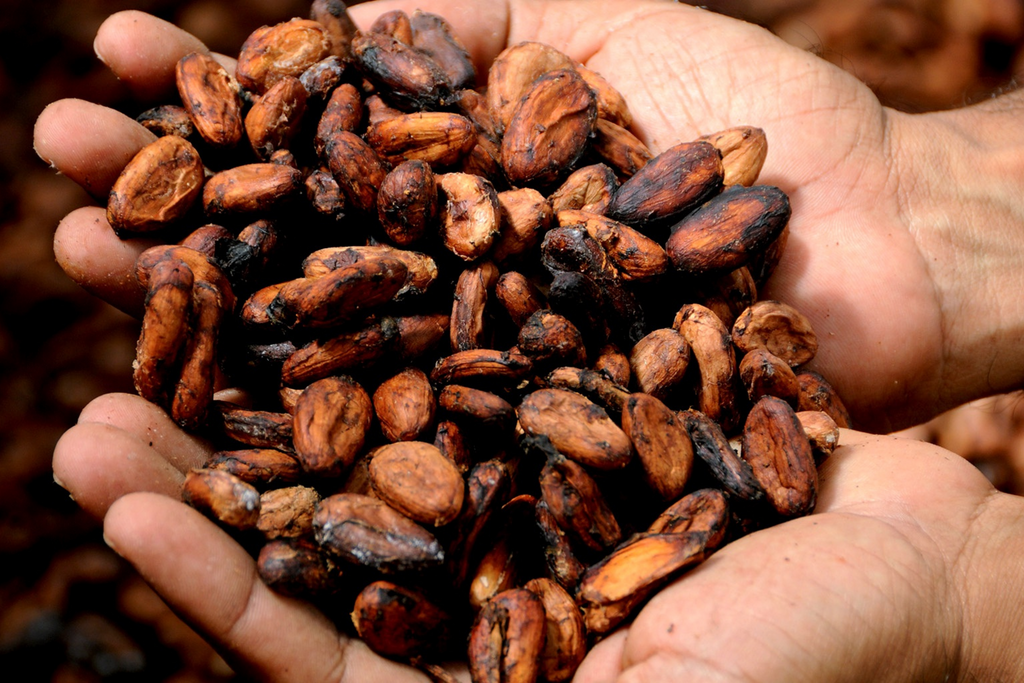Your Cart is Empty
Camu Camu: Superfood for Immunity & Skin Health
Camu camu (Myrciaria dubia) is a powerful superfood native to the Amazon rainforest. Th...
READ MORE
Discover the surprising health benefits of cacao, one of nature's most nutrient-dense superfoods. Explore how this key ingredient, more than just the main ingredient in chocolate, can elevate mood, improve heart health, balance blood sugar, and even offer neuroprotective benefits.
A true champion of the natural health world, Cacao is not just a key ingredient in everyone's favorite dessert - chocolate, but it's also a nutrient-dense medicinal plant with a fascinating history and a wide array of health benefits.
Cacao, scientifically known as Theobroma cacao, translates to "food of the gods" in Greek. It is native to the tropical regions of Central America and has been revered for its unique flavor and healing qualities for thousands of years. Its fruits, known as cacao pods, encase the precious cacao beans from which the coveted cacao powder and, eventually, chocolate is derived.
Cacao has an impressive ability to adapt to its environment, emerging from Latin American roots to thrive in an array of climates and conditions all over the world. From the ancient Mayans and Aztecs who held cacao in high esteem as a divine drink to its omnipresence in modern-day kitchens and gourmet confections, cacao's journey is as rich and appealing as it is tasty.
In the 17th century, cacao made its journey from the Americas to Europe, quickly becoming a luxurious staple among the elite. Fast-forward to today and cacao has become an integral part of the global culinary landscape, transcending its status from an exclusive delicacy to an everyday indulgence. Beyond its culinary appeal, cacao is gaining recognition for its potential health benefits, earning it the title of a "superfood."
Cacao is a powerhouse of nutrients. It is rich in flavonoids, a type of antioxidant renowned for its heart health benefits, among other things. It also boasts a high mineral content, including iron, magnesium, and zinc. Furthermore, cacao contains a significant amount of fiber, which promotes digestive health, and a moderate amount of protein.
Cacao is high in magnesium which is crucial for over 300 biochemical reactions in the body, including nerve function, muscle contraction, and maintaining a healthy heartbeat. Its iron content supports the production of red blood cells, while zinc plays a vital role in immune function and wound healing.
The flavonoids in cacao are linked to a myriad of health benefits, including reducing inflammation and boosting heart health. Moreover, cacao is an excellent source of theobromine, a natural compound that has mood-enhancing and stimulant properties, similar to caffeine.
Cacao's mood-enhancing qualities primarily stem from its rich content of phenylethylamine (PEA), a natural compound known to enhance mood and cognitive performance. PEA works by promoting the release of endorphins and neurotransmitters like dopamine, contributing to feelings of happiness and mental clarity.
Furthermore, cacao is also a rich source of theobromine, a natural stimulant that is structurally similar to caffeine but works without the jittery side effects. Theobromine can provide a gentle, long-lasting boost of energy and focus, which adds to cacao's cognitive benefits.
Research published in the Journal of Nutrition suggests that regular consumption of cacao flavonoids may enhance cognitive function, improve mood, and slow cognitive decline. The flavonoids work by increasing blood flow to the brain, which can stimulate neural activity and promote cognitive health.
One review noted that cacao could help manage stress and potentially reduce depression symptoms. The high concentration of polyphenols in cacao plays a crucial role in this mood enhancement, contributing to its positive effects on psychological well-being.
Cacao's link to heart health extends beyond its delightful taste; its robust flavonoid content lends itself to promising cardiovascular benefits. The heart, as we know, relies heavily on a well-maintained balance of cholesterol. Within cacao, flavonoids play a significant role in this balance, targeting 'bad' LDL cholesterol, which can accumulate within arterial walls leading to plaque formation.
Flavonoids found in cacao help to lower LDL cholesterol levels, enhancing cardiovascular health by preventing harmful buildup. Cacao doesn't stop at mitigating LDL cholesterol though, it actively enhances 'good' HDL cholesterol levels. This article shines a light on a study done byHull York School of Medicine that showed higher HDL levels are associated with a lower risk of heart disease. This 'good' cholesterol aids in the transport of cholesterol deposits away from the arteries and back to the liver, thus reducing risk factors for heart disease.
Moreover, cacao improves overall cardiovascular function by fostering improved blood flow. Flavonoids are recognized for their vasodilatory effect, relaxing the walls of blood vessels, and enhancing blood flow.
Cacao, with its rich, sensual flavor and aroma, is not just a treat for the taste buds... It is also reputed to stimulate more than just the palate. There is evidence suggesting that cacao can effectively enhance sexual function and boost libido.
The magic lies in its PEA (phenethylamine) content, a compound that triggers the release of endorphins and potent neurotransmitters in the brain, stimulating feelings of excitement and well-being. PEA is often referred to as the "love hormone" because it has been shown to be released during sexual activity. A study published in the National Library of Medicine has highlighted the link between daily chocolate intake and sexual health in women.
Furthermore, cacao contains high levels of magnesium, which promotes relaxation and stress reduction. As stress and anxiety are common libido dampeners, a magnesium boost can help improve overall mood and, in turn, sexual desire in both men and women.
Cacao also has profound implications on the modulation of blood pressure, owed largely to its rich concentration of flavonoids. The blood pressure dynamic in our bodies is complex, and cacao flavonoids seem to interface with it in a manner conducive to optimal health.
Nitric oxide is one such biochemical that plays a crucial role in maintaining optimal blood pressure levels. It acts as a powerful vasodilator, relaxing and expanding the walls of blood vessels to allow for efficient blood flow.
Flavonoids present in cacao are known to stimulate the production of nitric oxide, as witnessed in this study. By promoting nitric oxide synthesis, cacao flavonoids facilitate the reduction of blood pressure, thereby supporting vascular health.
Apart from this, there is a growing body of research underscoring the direct impact of cacao flavonoids on blood pressure. A meta-analysis of several randomized controlled trials found consistent evidence that cacao-rich diets resulted in a significant reduction in blood pressure. This effect was observed in both hypertensive and normotensive individuals, suggesting a universal benefit.
While dietary approaches to controlling blood pressure are multifaceted, cacao represents a simple yet powerful addition. Regular, moderate consumption of cacao, a balanced diet, and regular physical activity can contribute significantly to maintaining healthy blood pressure levels and overall cardiovascular health.
Cacao's influence extends beyond simple pleasures of taste. Integral to this are cacao's potent antioxidants, which research indicates can have a profound effect on insulin sensitivity, a key factor in blood sugar control and the prevention of type 2 diabetes.
Insulin sensitivity refers to how responsive our body's cells are to insulin, a hormone crucial in managing our body's glucose levels. In situations where insulin sensitivity is high, smaller amounts of insulin are required to store glucose, resulting in more stable blood sugar levels.
This study found that daily consumption of flavanol-rich cocoa was linked to improved insulin sensitivity, underscoring the role cacao can play in maintaining balanced blood sugar levels.
In addition to enhancing insulin sensitivity, the antioxidants in cacao, particularly flavonoids, may also directly reduce blood sugar levels. A meta-analysis examining the impact of cacao flavanol intake on various markers of cardiometabolic health discovered a significant reduction in fasting blood glucose.
The capacity of cacao to influence both insulin sensitivity and blood sugar levels positions it as an effective nutritional approach to support blood sugar control. Integrating cacao into a balanced diet may be a compelling strategy in the fight against type 2 diabetes and maintaining overall metabolic health.
A vibrant array of nutrients distinguishes cacao, with one often underappreciated attribute being its significant dietary fiber content. Dietary fiber, an indigestible carbohydrate, is renowned for promoting digestive health. It adds bulk to our diet, thereby facilitating regular bowel movements and guarding against constipation.
In a world where fiber intake often falls short of the recommended levels, incorporating high-fiber foods like cacao can be a valuable dietary adjustment. A Harvard review found that the inclusion of high-fiber foods could lead to healthier bowel function.
In addition to aiding bowel regularity, fiber from cacao may also nurture the gut microbiota, an assembly of microorganisms inhabiting our digestive system with substantial implications for health. This research highlights that dietary fiber can serve as a prebiotic, feeding beneficial gut bacteria, which in turn promote overall gut health and impact beyond the digestive system.
Furthermore, the antioxidant properties of cacao could potentially contribute to gut health. An investigation into polyphenols, a class of antioxidants present in cacao, suggested they may reduce inflammation in the digestive tract.
In essence, cacao's high-fiber content and potent antioxidant profile provide it with a remarkable ability to support digestive health in multiple ways. From enhancing bowel regularity to fostering gut microbiota, the incorporation of cacao into our diet is a positive step toward maintaining digestive wellness.
The natural richness of cacao in fiber and healthy fats can be pivotal in weight management strategies. A key aspect of sustainable weight management is satiety control - feeling satisfied after meals, and cacao's high fiber content plays a substantial role in this aspect.
Fiber, due to its low digestibility, occupies more space in the stomach, prolonging feelings of fullness. An in-depth systemic review supports this notion, revealing that dietary fiber can enhance feelings of satiety, potentially leading to reduced calorie intake.
Cacao also contains monounsaturated fats, often called "healthy fats". These fats, in contrast to their saturated counterparts, are linked to a range of health benefits including body fat reduction. Some studies suggest monounsaturated fats could also contribute to reducing visceral adiposity, the fat stored around the abdomen and organs, which is particularly harmful to health.
Beyond these characteristics, the antioxidant capacity of cacao may indirectly assist in weight management. It's believed that antioxidants contained in Cacao may improve metabolic function, reduce inflammation, and thus aid in maintaining a healthy body weight.
Incorporating cacao into a balanced diet can thus be part of a holistic approach to weight management, not solely due to its fiber and fat content but also its beneficial antioxidant properties.
Cacao's flavonoids, especially epicatechin, and catechin, have emerged as potent neuroprotective agents. These bioactive compounds have the potential to improve neuronal function, enhance brain plasticity, and even shield against neurodegenerative disorders.
Cacao flavonoids contribute to improved neuronal function by enhancing cerebral blood flow. A study found that flavonoid-rich cocoa significantly increased blood flow to the brain. This increased perfusion enhances the delivery of oxygen and nutrients, vital for optimal neuronal function.
The neuroprotective role of cacao also extends to the enhancement of brain plasticity. Brain plasticity, or neuroplasticity, refers to the brain's ability to reorganize itself by forming new neural connections throughout life. Dietary flavonoids like those found in cacao can increase the creation of neurons and enhance synaptic plasticity, fostering better brain health and cognitive function.
Lastly, the flavonoids present in cacao can offer defense against neurodegenerative diseases, such as Alzheimer's and Parkinson's. They achieve this by reducing oxidative stress and neuroinflammation, common factors in neurodegeneration. Long-term intake of cacao flavonoids can reduce the risk of cognitive decline in elderly individuals.
The potent flavonoids in cacao not only enhance cognitive performance and mood, as previously discussed but also offer substantial neuroprotective benefits, illustrating the remarkable potential of cacao in promoting overall brain health.
With roots tracing back to ancient cultures, cacao has been revered for its nutritional properties and health-boosting potential. It serves not just as the cornerstone of delectable chocolate creations, but as a powerful superfood, teeming with beneficial compounds.
The plethora of health benefits provided by cacao range from enhancing mood and cognitive performance to its libido-enhancing and heart-protective effects.
Its role in supporting digestion comes from its substantial fiber content, while its flavonoids and antioxidants lend a hand in balancing blood sugar levels, a crucial aspect for managing diabetes risk.
Additionally, cacao's beneficial role in weight management stems from its fiber content, which can impart satiety, and its mono-unsaturated fats which could help in body fat reduction. Neuroprotective benefits, such as improved neuronal function and protection against neurodegenerative diseases, are also linked to cacao's flavonoids.
However, it is essential to underline that cacao, despite its array of potential benefits, isn't a panacea. Achieving optimal health is a multifaceted process that incorporates a balanced diet, consistent physical activity, and an overall healthy lifestyle.
Click here to try Nutrigazm before it’s gone!

Camu camu (Myrciaria dubia) is a powerful superfood native to the Amazon rainforest. Th...
READ MORE
Blueberries are more than just a delicious superfood. Packed with essential nutrients, ...
READ MORE
Strawberries are more than a sweet snack—they’re a low-sugar, antioxidant-packed superf...
READ MORE